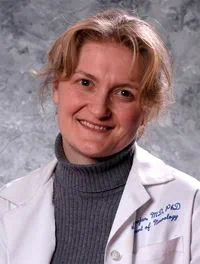UH Renews Role in StrokeNet Program
September 17, 2018
National network recruits and runs stroke trials efficiently and quickly
UH Innovations in Neurology & Neurosurgery - Fall 2018
 Sophia Sundararajan, MD
Sophia Sundararajan, MDThe Neurological Institute at University Hospitals of Cleveland recently renewed its role in the National Institutes of Health (NIH) StrokeNet program, a national network of 25 regional coordinating centers that includes more than 200 hospitals.
The centers were chosen in 2013 for their ability to recruit and run stroke trials efficiently and quickly, explains Sophia Sundararajan, MD, Director, Clinical Trials Unit, Neurological Institute, University Hospitals; Associate Professor, Neurology, Case Western Reserve University School of Medicine. “The trials conducted through StrokeNet are aimed at stroke prevention, acute intervention and recovery,” says Dr. Sundararajan, the principal investigator for the regional StrokeNet coordinating center.

The recent renewal extends UH’s participation in the program for another five years.
LEANER AND MEANER TRIALS
“The goal was to see if they could fundamentally change the way we do clinical trials to make things ‘leaner and meaner,’” Haney says. “The success of this program might change the ideology of research at the NIH in the future.”
The regional centers are able to streamline the process by which hospitals negotiate the contract to perform studies and approve them quickly through a central Institutional Review Board and master trial agreements, Dr. Sundararajan says.
“Many stroke trials have historically taken up to 10 years to complete, by which time the technology in them was outdated,” she adds. “StrokeNet unites sites that have a proven track record of enrolling patients quickly, moving the entire process along much more efficiently.”
For example, the recently completed DEFUSE 3 Trial was completed in less than two years. The study found that stroke patients with favorable neuroimaging benefited from endovascular thrombectomy up to 16 hours after last known normal. The technology in the trial is the same technology in current use, making the results immediately applicable.
The regional coordinating site based out of CWRU includes all of the major health centers in Cleveland (University Hospitals, Cleveland Clinic, MetroHealth and the Cleveland VA Medical Center) as well as Ohio Health in the Columbus area, Spectrum Health in Grand Rapids, Mich., the University of West Virginia in Morgantown, and the Mercy Health-St. Vincent Medical Center in Toledo.
The grant provides $1 million ($200,000 a year for five years) to CWRU to cover the administrative costs of running the network and coordinating the grants for the individual studies in which members participate. Haney praised the collaborative spirit that it encourages.
“It brings together four Cleveland institutions that normally are somewhat competitive and allows us to work together on overcoming barriers for getting patients into the latest trials,” he says.
PACE OF STUDIES SHOULD INCREASE
Work in the program in its first five years has been substantial, Dr. Sundararajan says. In addition to the DEFUSE 3 study, the I-DEF study examined the use of deferoxamine mesylate to reduce iron levels in the brain after intracerebral hemorrhage. The study has been completed and data are being analyzed.
The Telerehab trial showed that in-home therapy using a telehealth system is effective in improving arm function in stroke survivors. This trial will make rehabilitation more accessible to patients who may not be able to travel to an outside facility.
About 35 UH patients participated in these three trials over the past five years, at UH and at the other local sites, Dr. Sundararajan says. “Being part of this program gives our patients more access to cutting-edge research than we could offer them on our own.”
Dr. Sundararajan says she is pleased that the grant was renewed, as it helps validate the success that UH has had with the program to date. She expects that the pace of the trials will increase as StrokeNet enters the next five-year phase.
“We anticipate seeing even more studies and being able to offer more options beyond standard medical care for our patients, both here at UH and at the other participating hospitals in the consortium, if we feel they have something that is more appropriate for a specific patient,” she says.
The renewal also includes some funding to help facilitate training of new investigators, which Dr. Sundararajan calls an exciting additional component.


